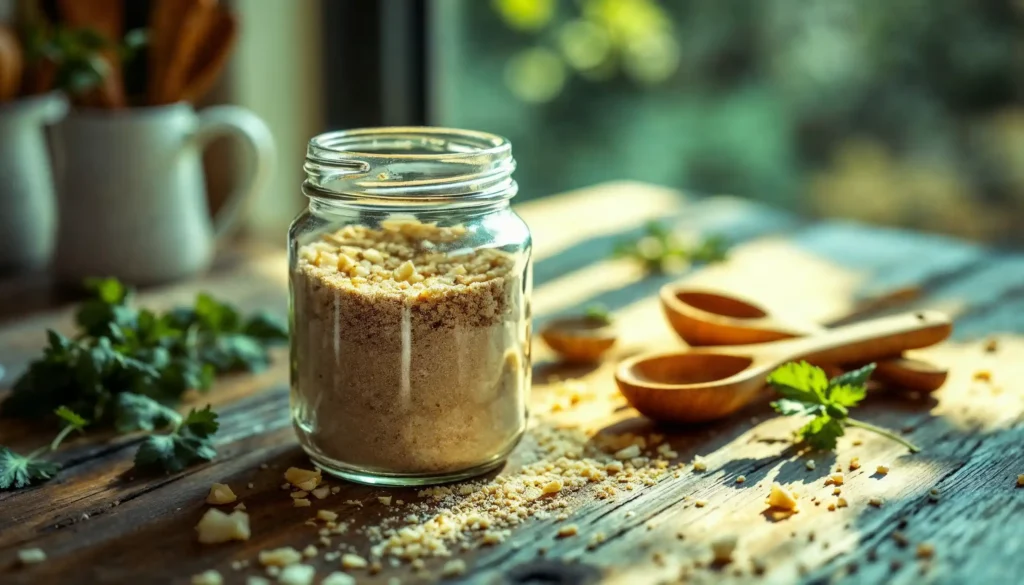Introduction
Lipton Onion Soup Mix is a popular kitchen staple, used in everything from quick soups to flavorful dips and hearty casseroles. Its versatility and rich taste have made it a go-to for many home cooks. However, one concern often raised about this product is its sodium content. With sodium playing a major role in flavor enhancement and food preservation, it’s no surprise that products like Lipton Onion Soup Mix can contain significant amounts of it.
For those monitoring their sodium intake—whether for health reasons or personal preferences—understanding the nutritional profile of this mix is essential. Excess sodium in your diet can contribute to various health issues, including high blood pressure and heart disease, making it important to be informed about the foods you consume regularly.
This article will take an in-depth look at the sodium content in Lipton Onion Soup Mix, how it compares to dietary recommendations, and provide actionable tips for managing sodium intake without sacrificing flavor. By the end, you’ll have all the information you need to decide whether this beloved pantry item fits into your diet.
“Try this flavorful twist on meatloaf with a classic Lipton onion soup mix.”
Nutritional Profile of Lipton Onion Soup Mix
Lipton Onion Soup Mix is more than just a seasoning; it’s a blend of flavors and ingredients that contribute to its distinct taste. However, the nutritional profile reveals more than just its savory appeal. Let’s examine its sodium content and other nutritional components.
Sodium Content Per Serving in Lipton Onion Soup Mix
The sodium content of Lipton Onion Soup Mix is one of its most notable nutritional characteristics. On average, one tablespoon (about 6.5 grams) of the dry mix contains 610 to 710 milligrams of sodium. To put this into perspective, the American Heart Association (AHA) recommends that adults limit their sodium intake to 2,300 milligrams per day, with an ideal limit of 1,500 milligrams for those looking to reduce health risks.
Given these guidelines:
- 1 tablespoon of Lipton Onion Soup Mix provides approximately 30-47% of the recommended daily sodium intake.
- A single packet, which typically contains about 2 tablespoons of the mix, can contribute up to 1,420 milligrams of sodium—over half the daily recommended limit.
This makes Lipton Onion Soup Mix a high-sodium product, especially for individuals who frequently use it in recipes or consume it as part of soups and dips.
“Explore Why Milk Instead of Water in Meatloaf”
Other Key Nutritional Values of Lipton Onion Soup Mix
While sodium is the most discussed component of Lipton Onion Soup Mix, its overall nutritional profile includes other factors to consider:
- Calories: Each tablespoon contains about 20 calories, which is relatively low, making it a calorie-conscious choice for flavor enhancement.
- Carbohydrates: Approximately 4 grams of carbohydrates per serving, largely from sugars and starches used in the mix.
- Fat: Lipton Onion Soup Mix contains 0 grams of fat, which may appeal to those on low-fat diets.
- Additives and Preservatives: Common additives include monosodium glutamate (MSG) and dehydrated vegetables like onion and garlic, which enhance flavor but may raise concerns for those sensitive to MSG.
Understanding these components can help you make an informed decision about incorporating the mix into your meals.
Why Sodium Content in Lipton Onion Soup Mix Matters
The high sodium content in Lipton Onion Soup Mix isn’t just a number on the label—it has implications for health and dietary choices. Sodium, while essential for bodily functions like nerve signaling and fluid balance, can lead to health risks when consumed in excess.
“Discover techniques for creating a juicy and flavorful meatloaf.”
Health Impacts of High Sodium in Lipton Onion Soup Mix
Excess sodium intake has been linked to several health concerns, including:
- High Blood Pressure (Hypertension): Sodium can cause the body to retain water, increasing blood pressure. Chronic hypertension is a major risk factor for heart disease and stroke.
- Cardiovascular Diseases: Diets high in sodium are associated with an increased risk of heart attacks and heart failure.
- Kidney Function: High sodium levels can strain the kidneys, as they work harder to filter the excess, potentially leading to kidney damage over time.
Sodium Sensitivity in Certain Populations
Some groups are more sensitive to sodium intake and must monitor it closely:
- Individuals with Hypertension or Heart Disease: Limiting sodium is a key recommendation for managing these conditions.
- People with Kidney Disease: Excess sodium can worsen kidney function and increase the risk of complications.
- Older Adults: Aging can heighten sodium sensitivity, increasing the likelihood of health issues from high sodium diets.
If you fall into any of these categories, reducing sodium intake is crucial, and that includes limiting high-sodium products like Lipton Onion Soup Mix.
Comparison of Lipton Onion Soup Mix with Alternatives
When considering whether Lipton Onion Soup Mix is suitable for your diet, it helps to compare its sodium content with similar products and alternatives. This section explores how it stacks up against other store-bought options and homemade substitutes.
“Find out whether cooking onions beforehand impacts your meatloaf recipe.”
Store-Bought Onion Soup Mixes
Lipton Onion Soup Mix is one of many onion soup mixes available on the market. While it’s a convenient option, its sodium content is comparable to, or higher than, that of its competitors. Here’s a look at how it compares:
- Knorr Onion Soup Mix: This brand contains approximately 600-680 milligrams of sodium per serving, slightly lower than Lipton.
- Great Value (Walmart) Onion Soup Mix: A budget-friendly option with around 650 milligrams of sodium per serving, making it similar to Lipton.
- Private Label Brands: Many store brands replicate Lipton’s formula, and their sodium content often hovers between 600-750 milligrams per serving.
These comparisons reveal that most store-bought onion soup mixes are high in sodium, with variations of only 10-15% among brands. Choosing one over another may not significantly impact your overall sodium intake.
Homemade Alternatives
Making your own onion soup mix at home can be a healthier and more customizable alternative. Homemade mixes allow you to control the amount of sodium and eliminate additives like MSG. A basic recipe typically includes:
- Dehydrated Onions: These provide the core flavor.
- Onion Powder and Garlic Powder: Enhance the taste without added sodium.
- Herbs and Spices: Such as parsley, paprika, or black pepper for extra flavor.
- Optional Salt: Add sparingly or replace with low-sodium options like potassium chloride.

Example of a Low-Sodium Onion Soup Mix Recipe:
- Ingredients:
- 1/4 cup dehydrated onion flakes
- 2 teaspoons onion powder
- 1 teaspoon garlic powder
- 1 teaspoon dried parsley
- 1/2 teaspoon paprika
- 1/4 teaspoon black pepper
- Optional: 1/2 teaspoon salt or a salt substitute
- Instructions:
- Combine all ingredients in a bowl and mix well.
- Store in an airtight container for up to 6 months.
This homemade version can contain as little as 50-100 milligrams of sodium per serving, depending on whether salt is added, making it significantly lower in sodium than store-bought mixes.
“Learn why milk enhances the texture and balances flavors in meatloaf.”
Tips to Manage Sodium Intake with Lipton Onion Soup Mix
Even if you prefer the convenience of Lipton Onion Soup Mix, there are strategies to use it without exceeding your daily sodium limits. The following tips focus on portion control and ingredient substitutions.

Portion Control Strategies
Reducing the amount of mix used in your recipes is an effective way to cut sodium. Here’s how:
- Dilution: Use half the recommended amount of soup mix and combine it with unsalted seasonings like garlic powder, onion powder, or fresh herbs.
- Smaller Portions: Adjust the serving size of your dishes to lower the sodium intake per serving.
- Blend with Low-Sodium Ingredients: When preparing dips, soups, or casseroles, incorporate low-sodium components such as plain Greek yogurt, unsalted broth, or fresh vegetables.
Enhancing Flavor Without Extra Sodium
If you’re concerned about losing flavor when reducing the amount of Lipton Onion Soup Mix, consider these alternatives:
- Spices and Herbs: Enhance dishes with bold spices like smoked paprika, cumin, or turmeric.
- Fresh Aromatics: Onions, garlic, and leeks can provide a natural, sodium-free flavor boost.
- Low-Sodium Broth Alternatives: Instead of water, use low-sodium or homemade broths to enhance the taste without adding significant sodium.
These approaches allow you to enjoy the flavors you love while maintaining a healthier sodium intake.
“Understand how the smoking process affects meatloaf recipes and seasoning.”
FAQs
When it comes to Lipton Onion Soup Mix, several frequently asked questions arise regarding its nutritional content, dietary suitability, and alternatives. Here, we address the most common inquiries to help you make informed decisions.
Why do people add milk to their meatloaf?
People add milk to meatloaf primarily to keep it moist and tender. Milk is often combined with breadcrumbs, oats, or crackers to create a “panade,” which is a mixture that retains moisture and helps bind the meatloaf. This ensures that the finished dish has a soft, cohesive texture instead of being dry or crumbly. Additionally, the milk enhances the overall flavor by blending with the other ingredients.
What is the secret to a great meatloaf?
The secret to a great meatloaf lies in balancing moisture, flavor, and texture. Here are some tips:
- Use a Panade: Combining breadcrumbs or oats with milk helps retain moisture.
- Don’t Overmix: Gently combine the ingredients to avoid a dense, tough texture.
- Add Aromatics: Sautéed onions, garlic, or peppers enhance flavor.
- Season Generously: Use salt, pepper, and herbs like thyme or parsley for a well-rounded taste.
- Rest Before Slicing: Let the meatloaf rest for 10 minutes after baking to allow the juices to redistribute.
- Use a Topping: A glaze made of ketchup, mustard, or brown sugar adds a delicious sweet-and-savory finish.
Can you use water instead of milk in meatloaf?
Yes, you can use water instead of milk in meatloaf, but it may slightly alter the texture and flavor. Water can hydrate the breadcrumbs, but it won’t add the richness and creaminess that milk provides. To make up for the flavor difference, consider using broth, stock, or unsweetened plant-based milk as alternatives. Adding an extra egg or a bit of olive oil can also help improve the texture.
Why do you use milk instead of water in baking?
Milk is preferred over water in baking because it adds richness, flavor, and a softer crumb to baked goods. Milk contains proteins, fats, and sugars, which contribute to browning and create a tender texture in cakes, muffins, and breads. Water, while hydrating, lacks these additional components, which can result in a denser, less flavorful product. For recipes requiring a delicate or moist texture, milk is the better choice.
Conclusion
Lipton Onion Soup Mix is undeniably a convenient and flavorful addition to many recipes, but its high sodium content warrants consideration, especially for those mindful of their sodium intake. With about 610-710 milligrams of sodium per tablespoon and 1,400-1,500 milligrams per packet, it can quickly contribute a substantial portion of your daily sodium allowance.
While occasional use of Lipton Onion Soup Mix can fit into a balanced diet, moderation is key. For those seeking to reduce sodium without sacrificing flavor, several strategies can help, including using smaller portions, pairing the mix with low-sodium ingredients, or opting for homemade alternatives. Additionally, understanding its nutritional profile and health impacts can empower you to make more informed dietary choices.
By taking these measures, you can continue to enjoy the rich, savory taste of Lipton Onion Soup Mix while keeping your sodium intake within healthy limits. With a bit of creativity, you can make flavorful meals that support your overall well-being.
